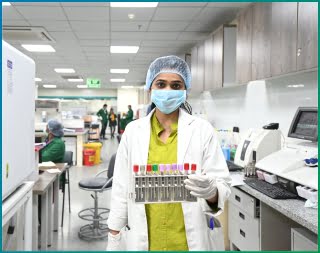
The COVID-19 pandemic has drastically changed the landscape of public health, necessitating the rapid development and deployment of various diagnostic tests.


Among these, the COVID-19 antigen test Mumbai has emerged as a crucial tool in the detection of the virus responsible for COVID-19, offering a quick and relatively simple way to identify infections. An antigen test is a diagnostic tool that detects specific proteins (antigens) present on the surface of the SARS-CoV-2 virus, which causes COVID-19. Unlike PCR (polymerase chain reaction) tests that detect the virus's genetic material, antigen tests provide a quicker alternative that can deliver results in as little as 15 to 30 minutes.
1] Speed of Results: One of the most significant advantages of antigen tests is their rapid turnaround time. Many tests can provide results in under 30 minutes, making them ideal for settings where quick decision-making is essential.
2] Ease of Use: Antigen tests are relatively simple to administer, requiring minimal training for personnel. This ease of use allows for widespread testing in various environments, including schools, workplaces, and public health settings.
3] Cost-Effective: Generally, antigen tests are less expensive than PCR tests Mumbai. This cost-effectiveness makes them accessible for mass testing initiatives, especially in low-resource settings.
4] Facilitating Rapid Screening: Antigen tests can facilitate rapid screening in settings like airports, concerts, and sporting events, allowing for immediate identification of potential cases and reducing transmission risks.
1] Sensitivity Issues: While antigen tests are efficient, they are less sensitive than PCR tests, meaning they may produce false-negative results, especially in individuals with low viral loads. This limitation is particularly concerning in the early stages of infection or in asymptomatic individuals.
2] Specificity Concerns: Although antigen tests are generally specific, there is a risk of false positives, especially in populations with low prevalence of the virus. This risk can lead to unnecessary isolation or additional testing.
3] Timing of the Test: Covid-19 Antigen tests are most effective when administered during the peak of viral replication, usually within the first week of symptoms. Testing outside this window may result in missed infections.
4] Regulatory Variability: The performance of antigen tests can vary widely between different brands and manufacturers. It is crucial to use tests that are authorized by health authorities and have been validated for accuracy.
1] Positive Result: A positive covid-19 antigen result Mumbai indicates the presence of SARS-CoV-2 antigens, suggesting an active infection. Individuals with positive results should follow local health guidelines, which may include self-isolation and informing close contacts.
2] Negative Result: A negative covid-19 antigen result Mumbai does not definitively rule out an infection. If symptoms persist or exposure to a confirmed case has occurred, follow-up testing with a PCR test may be recommended.
3] Context Matters: The interpretation of test results should always consider the context, including local prevalence rates and individual risk factors.
At Diagnopein, we offer comprehensive, accurate, and timely diagnostic services, including the Covid-19 Antigen test in Mumbai. With our Advanced labs, cutting-edge technology, and skilled technicians, you can be assured of reliable results every time. Get your results quickly, especially when time is crucial in detecting severe infections.
Competitive pricing without compromising on quality. Our team of experienced professionals ensures the test is conducted smoothly with minimal discomfort. We provide not just the Covid-19 Antigen test results but insights into your health condition, helping you and your doctor make informed decisions about treatment. For more information call us at +91 9204 108108.
Yes, antigen tests are safe. The testing process involves a standard nasal swab and carries minimal risks.
Antigen tests can facilitate rapid screening, help identify outbreaks early, and enable quick decision-making in settings like airports, schools, and healthcare facilities.
While antigen tests are valuable, they are often used alongside PCR tests and clinical evaluations for a comprehensive assessment of COVID-19.
Antigen tests are less sensitive than PCR tests, which means they may produce false negatives, especially in individuals with low viral loads or during early infection. They can also yield false positives in low-prevalence populations.